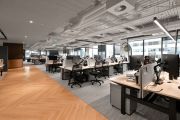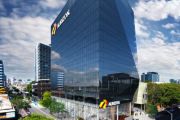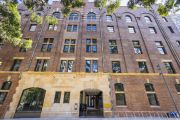Fab9, a makerspace, officially opens in Footscray's Dream Factory
A former factory in Footscray has returned to its maker roots, with the official opening of the Fab9 makerspace – a place where, for a monthly fee, creators can use high-end machines and technology to bring their inventions to life.
Fab9, on the sunlit ground floor of the Dream Factory on the banks of the river at 90 Maribyrnong Street, is the brainchild of Silicon Valley survivor and chief executive Hans Chang. It houses a range of prototyping and manufacturing equipment – from 3D printers and laser cutters to electronics and industrial sewing machines – that emerging and professional inventors and makers can operate.
Mr Chang told Commercial Real Estate: “We’re trying to make machines less scary. Anyone can be a maker.”
The site on which the four-level building now stands has been used for inventing and making since 1875, when it first housed a jute factory.
In 1906 Barnett Glass Rubber, the first producers of rubber and rubberised clothing in Australia, took over the site and constructed the current building in the 1920s.
The red-brick building was designed by Joseph Plottel, who also designed the Footscray Town Hall. In 1939, Bradford Cotton Mills purchased the building and, for the next period, the space housed a variety of commercial and office activities.
In 2000 Lonely Planet moved in, running their global operations from there until 2016.
In 2005, Trilogy Funds Management purchased the building for $14.4 million.
In March 2015, the Impact Investment Group, owned by chief executive Chris Lock and Small Giants – the private investment company of Berry Liberman – paid $13.5 million for the building.
Mr Lock said when IIG bought it, they knew they had to find tenants for a 6500-square-metre building that was not, at that point, “a well established office market”. They found that the “depth of the demand seemed to be from creative-style tenants, little bit of light manufacturing and technology”.
They established the Dream Factory: “a dedicated space for design, technology and social impact in Footscray, Victoria”. Tenants include Engineers without Borders, Urban Edge Homes, and co-working space Inspire9.
A year ago Mr Lock took sole ownership of the building, after leaving IIG to establish IP Generation.
Fab9 has had its doors open for three weeks, and launched on Thursday, June 27. They have 16 members and are aiming for 400.
Mr Lock said: “It actually feels really exciting. When you see all the machinery in there, particularly when there are people on the tools, you can actually see prototypes of things coming to life.”
Mr Chang said: “I’m excited, but I am tired.”
It’s been a long journey for the Fab9 team. Mr Chang continued, “Fundraising has been the biggest hurdle, and fighting the bureaucracy. That takes time, right? And that time takes money.”
In 2016 Fab9 received $650,000 in funding from LaunchVic, with another grant in 2018 for $350,000.
Established in 2016, LaunchVic is a Victorian government initiative designed “to support the startup ecosystem in Victoria”. The rest of funding has come from private investors, including American investor and the father of Makerspaces Evan Malone, who is the main stakeholder in Fab9.
Mr Chang said the other challenge had been getting the public, and governing bodies, to understand the “new concept” of makerspaces, which have been established in the US since 2010 when Mr Malone opened the first NextFab, now a ”network of collaborative makerspaces for creators of any skill level or interest”.
But in Australia, “the challenge is trying to communicate what a makerspace is”. Fab9’s slogan was at first “empowering inventors” but they found this did not feel inclusive so it is now “empowering makers” as, Mr Chang says, “more people relate to being a designer or maker”.
Fab9 has a range of memberships, hosts courses on how to use the equipment, and is open Tuesday to Sunday from 10am to 5pm, and until 9pm on Wednesday and Thursday – “for people who may have full-time jobs and they come after work,” said Mr Chang.
They would like to be open longer hours in the future.
“With certain things, like electronics, we could be open more hours. But for things like the timber shop – we obviously don’t advise people to be working with a tabletop saw at three o-clock in the morning!”
Get a weekly roundup of the latest news from Commercial Real Estate, delivered straight to your inbox!






